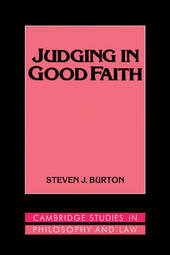
|
Judging in Good Faith
Hardback
Main Details
| Title |
Judging in Good Faith
|
| Authors and Contributors |
By (author) Steven J. Burton
|
| Series | Cambridge Studies in Philosophy and Law |
|---|
| Physical Properties |
| Format:Hardback | | Pages:292 | | Dimensions(mm): Height 237,Width 159 |
|
| Category/Genre | Social and political philosophy |
|---|
| ISBN/Barcode |
9780521419949
|
| Classifications | Dewey:340.112 |
|---|
| Audience | | Professional & Vocational | | Tertiary Education (US: College) | |
|---|
|
Publishing Details |
| Publisher |
Cambridge University Press
|
| Imprint |
Cambridge University Press
|
| Publication Date |
28 August 1992 |
| Publication Country |
United Kingdom
|
Description
This book offers an original theory of adjudication focused on the ethics of judging in courts of law, and proposes two main theses. One is the good faith thesis, which defends the possibility of lawful judicial decisions even when judges exercise discretion. The other is the permissible discretion thesis, which defends the compatibility of judicial discretion and legal indeterminacy with the legitimacy of adjudication in a constitutional democracy. Together these two theses oppose both conservative theories that would restrict the scope of adjudication unduly, and leftist critical theories that would liberate judges from the rule of law.
Reviews"Public law scholars and political theorists interested in jurisprudence will find this book rewarding on at least three counts--the originality of its substantive contribution respecting a central and much-debated jurisprudential issue, the lucidity of its argumentation, and its careful reckoning with much of the relevant literature. The first count indicates why law-and-political-science scholars should peruse it. The latter two counts give it great potential utility as a core volume for introducing contemporary American jurisprudence to political science students as part of a graduate or advanced honors seminar in public law. All three counts together make it a delight to read--almost regardless of the extent to which one winds up agreeing or disagreeing with its main argument." The Review of Politics "This is a very fine book...Burton's account of weighing merits more attention. Much in the account is illuminating and will ring true to anyone with sufficient legal experience. What is true of the account of weighing is true of the book in general. All too often the philosophy of law is not adequately informed by a sound lawyer-like grasp of the law. Judging in Good Faith goes a long way toward correcting this fault. It is a masterful blend of law and philosophy that merits and rewards careful study. Anyone seriously interested in the philosophy of law should study Judging in Good Faith." Richard Warner, Ethics "Judging in Good Faith is the Old Man and The Sea of jurisprudential literature. Burton's clear, unadorned prose is readily accessible to nonspecialists. If for no other reason than this, the book would be a worthwhile contribution to the literature. Happily, the book manifests numerous other virtues." Raymond A. Belliotti, International Studies in Philosophy
|